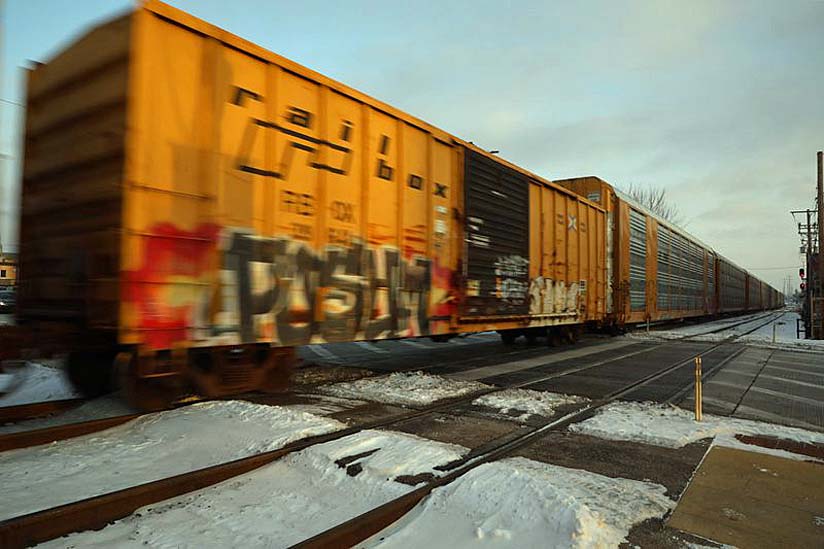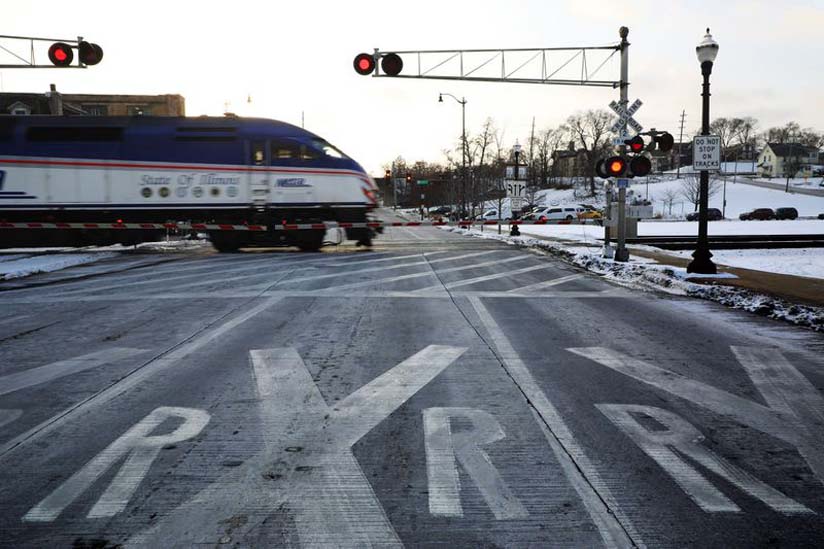
America
Chicago Illinois USA - A proposed railroad merger would mean more freight trains in the Chicago area, and Metra and some communities say
residents could feel the effects.
Metra is concerned the merger could mean more delays on some of its lines.
Elgin is concerned about more noise and a potential uptick in trains carrying contaminants running alongside the Fox River.
And communities up and down the affected train line worry more longer trains could mean delays at road crossings for drivers and first responders trying to
reach emergencies.
The US$31 billion merger would combine the Canadian Pacific (CP) and Kansas City Southern (KCS) railroads.
It is still pending approval by the federal Surface Transportation Board (STB).
If approved, the merger would create the only railroad linking Canada, Mexico, and the United States.
It would be the first major railroad merger since the 1990s.
In the Chicago area, where train traffic is already dense, CP shares tracks with Metra's Milwaukee District West and North trains.
The railroad also shares tracks with Amtrak trains, including the Hiawatha service to Milwaukee, and parts of the long distance Empire Builder service out of
Chicago.
KCS doesn't operate in the Chicago region, though it does cross paths with Amtrak downstate, near East St. Louis.
The merger would likely bring an uptick in freight trains to parts of the Milwaukee District West Line, which runs to Schaumburg and Elgin.
CP is projecting the merger could boost the number of trains to an average of 11.41 per day by 2027, compared with 3.41 trains per day without the
merger.
CP is not projecting an increase in freight traffic along the Milwaukee District North line, which runs to Glenview, Deerfield, and Lake Forest.
The company said in its federal merger application it did not expect the uptick would affect Metra or Amtrak service, because in the places where freight
traffic is expected to increase there is capacity for additional trains, and the company would schedule freight trains around passenger trains.
Amtrak threw its support behind the merger Thursday, saying CP has consistently earned top marks for causing the least delay to Amtrak
passengers.
CP has also committed to working with Amtrak to expand and extend service, Amtrak said, including more service between Chicago and Milwaukee, and extending
additional service to St. Paul, Minnesota.
"CP has been an excellent host of Amtrak intercity passenger service year after year and has established itself as a leader in the railroad
industry. We welcome CP's commitment to our efforts with states and others to expand Amtrak service and are pleased to have reached an agreement formalizing
CP's support of Amtrak expansion in the Midwest and the South," Amtrak President Stephen Gardner said in a statement.
But Metra remains concerned the merger could "seriously impact our service by increasing delays due to freight interference" on the Milwaukee lines,
and it will evaluate CP's statements that service would not be interrupted, Metra officials said in a statement.

Communities along the Milwaukee District West Line are also concerned about more frequent and longer freight trains, and in some cases are looking for
help from CP to offset the effects of increased freight traffic.
That could include funding work to create quiet zones, where trains are not required to blow their horns at crossings, or for trains to take the tracks over
or under roads.
Communities' concerns about the length and frequency of trains are valid, but the key is to find a balance between alleviating their concerns and letting the
railroads operate efficiently, bringing needed goods from one place to another, said Karen Darch, village president of Barrington and a board member of the
Chicago Metropolitan Agency for Planning who has worked on railroad issues.
"We need transportation, this is a big industry for us, for the country. And yet we want our communities to be safe and livable," she
said.
And there is good news about the merger, she said, A failed bid by rival Canadian National (CN) to take over KCS would have meant even more freight trains
running through a wide swath of Chicago suburbs.
CN has more track in the region than CP.
CN offered more money for KCS, but lost a bidding war with CP because the STB rejected part of its acquisition plan.
But for cities like Elgin, even the CP deal is likely to bring repercussions.
The tracks that carry Metra and CP trains run along the Fox River through the city's downtown, and City Manager Rick Kozal fears CP's estimate of 11 freight
trains after the merger could be an under count because of the significance of creating a rail line extending from Canada to Mexico.
The trains could cause problems for commuters, fire trucks, and police squads trying to cross the river from the east side to the west side of town, Kozal
said.
Long trains have the potential to block four major bridges across the river at once.
The number of homes in the city's downtown is also increasing, and more freight trains could mean more noise for those residents as trains blow their horns at
road crossings, he said.
More trains carrying potential contaminants along the river, which is the city's drinking water source, is another concern.
"It's hard to argue against the commercial benefits that will occur from unifying these lines, and so the city's trying to be realistic in terms of
balancing its own interests with the greater benefit that can come for the U.S. economy. We're just asking, with the recognition that the railroads are going
to benefit from this merger, we need some help," he said.
Farther east along the line, Itasca is spearheading a coalition of several communities raising concerns about the merger, Mayor Jeff Pruyn said.
He was particularly concerned about the prospect of a train blocking all of Itasca's rail crossings at once and slowing response to an emergency, citing an
instance nearly 60 years ago when a country club burned down because fire response was delayed by a freight train.
Blocked roads could also impede school buses and traffic, he said.
And increased vibrations from more longer trains could wreak havoc on the homes alongside the tracks in town.
He, like leaders in other communities, is seeking more information about the effects of the merger.
CP said it had met with suburban city leaders, and was working with the STB to analyze their concerns.
"While the overall impact of the CP/KCS transaction is unambiguously pro-environment, and pro-economic growth, we recognize that we will be increasing
the number of trains that operate through some communities. We will work hard to be a good neighbor," CP said in a statement.
Sarah Freishtat.
(there was no image with original article)
(usually because it's been seen before)
provisions in Section 29 of the Canadian
Copyright Modernization Act.
